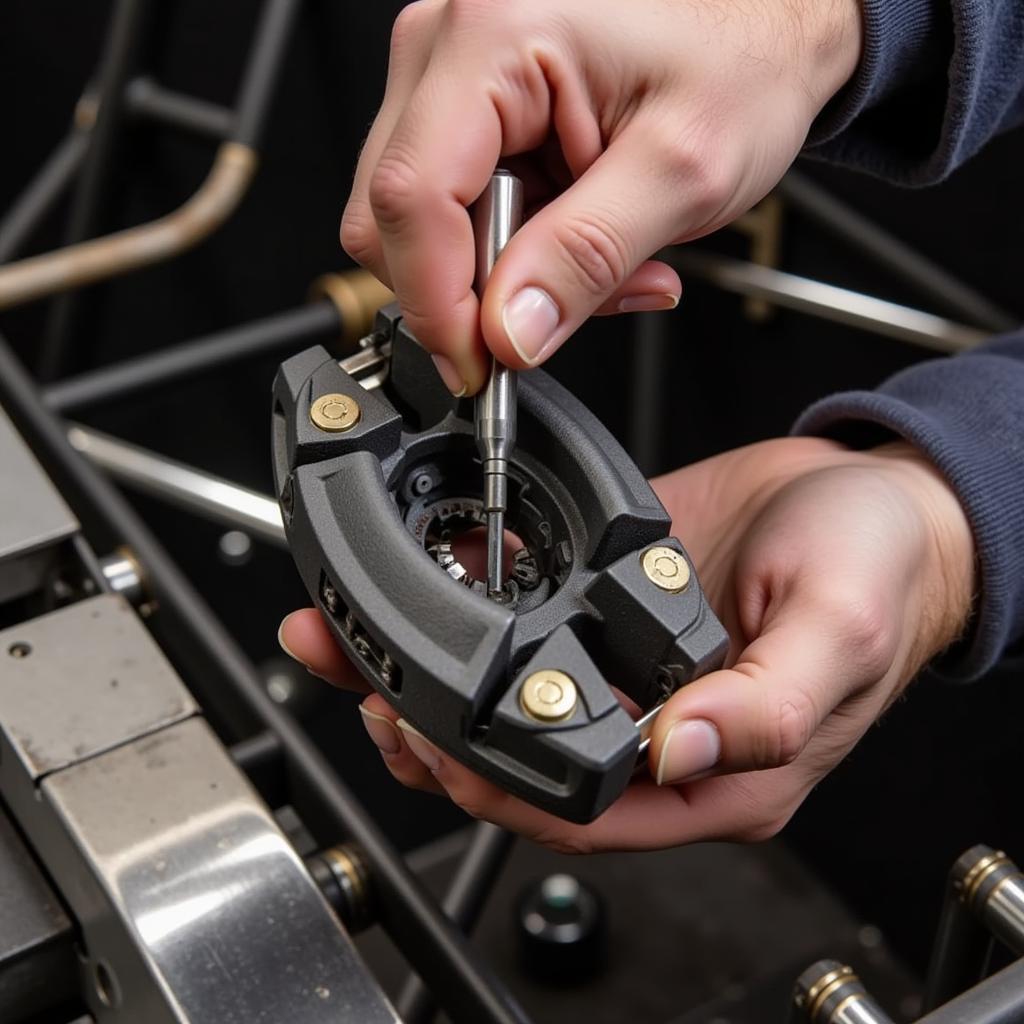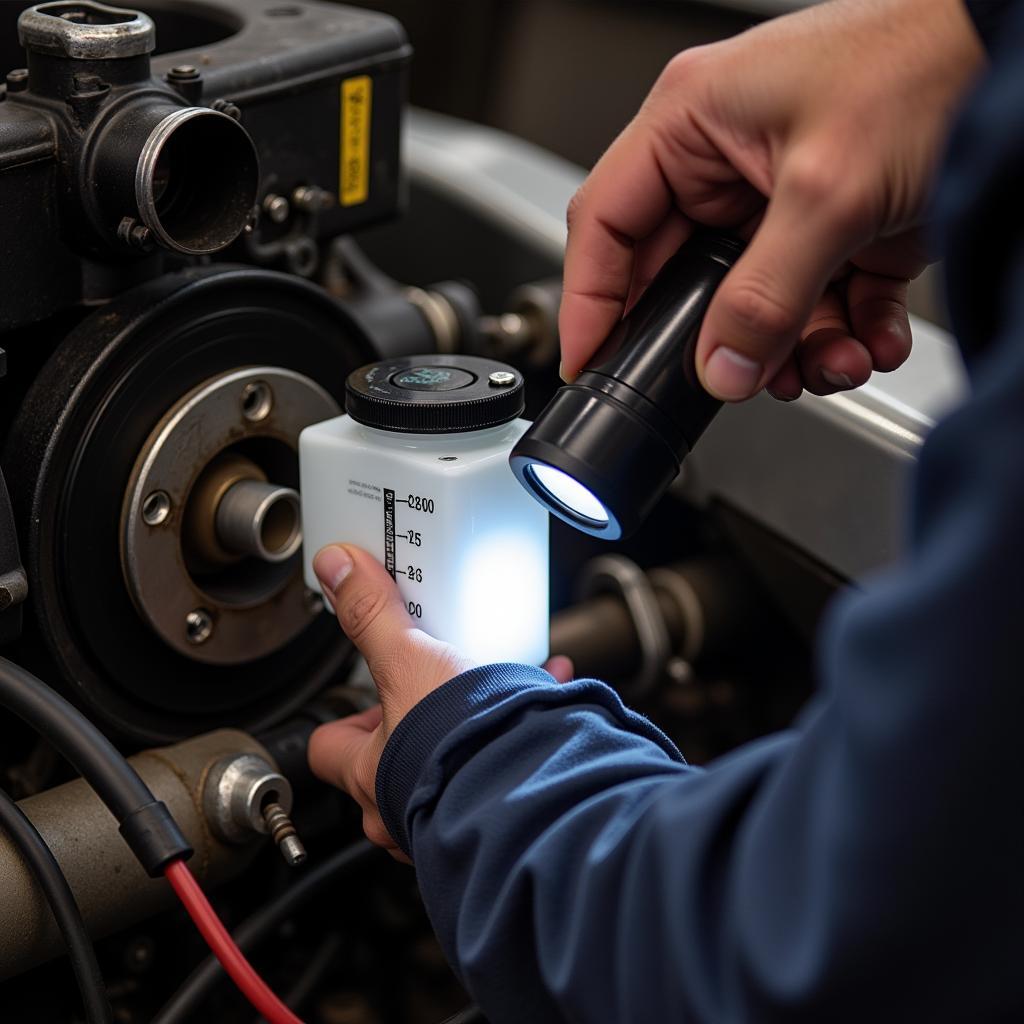Sprint Car Brake Problems can be a real headache, impacting performance and safety on the track. This guide provides a comprehensive overview of common sprint car brake issues, troubleshooting techniques, and preventive maintenance tips.
Understanding Your Sprint Car’s Braking System
Before diving into specific problems, it’s essential to understand the basic components of a sprint car’s braking system. These high-performance vehicles demand a robust and responsive braking system, quite different from your average road car. We’re talking about intense heat, extreme forces, and the need for precise control. The main components include the master cylinder, brake lines, calipers, rotors, and brake pads. Each part plays a critical role, and a failure in any one can compromise the entire system.
Common Sprint Car Brake Problems and Solutions
Several issues can plague a sprint car’s braking system, ranging from simple fixes to more complex problems. Let’s explore some of the most common culprits:
-
Soft Pedal: A soft brake pedal often indicates air in the brake lines. Bleeding the brakes is usually the solution, ensuring all air is purged from the system. Another possible cause is a failing master cylinder.
-
Spongy Pedal: This can point to a worn-out master cylinder or flexible brake lines. Replacing these components is crucial for restoring proper brake function.
-
Hard Pedal: A hard pedal can be caused by a seized caliper or a blockage in the brake lines. Careful inspection and cleaning or replacement of the affected parts are necessary.
-
Dragging Brakes: This issue can stem from a sticking caliper piston or a collapsed brake hose. Addressing this promptly prevents excessive heat buildup and premature wear.
 Inspecting a Sprint Car Brake Caliper
Inspecting a Sprint Car Brake Caliper
-
Uneven Braking: Uneven braking can be dangerous, causing the car to pull to one side during braking. This often results from uneven pad wear or a malfunctioning caliper. Replacing the pads and ensuring proper caliper function are vital for safe and controlled braking.
-
Brake Fade: Brake fade, a decrease in braking effectiveness during extended use, is usually caused by overheating. Upgrading to high-performance brake pads and ensuring proper ventilation can mitigate this issue.
Preventive Maintenance for Sprint Car Brakes
Preventing brake problems is always better than fixing them. Regular maintenance is key to ensuring optimal performance and safety. Here’s a checklist:
-
Inspect Brake Pads: Check the thickness and condition of the brake pads regularly. Replace worn pads promptly.
-
Check Brake Fluid: Ensure the brake fluid level is correct and the fluid is clean. Flush the brake fluid periodically to prevent contamination and maintain optimal performance.
-
Inspect Brake Lines: Look for leaks, cracks, or damage to the brake lines. Replace any compromised lines immediately.
-
Clean and Lubricate Calipers: Regularly clean and lubricate the caliper slides to prevent sticking and ensure even braking.
 Checking Brake Fluid in a Sprint Car
Checking Brake Fluid in a Sprint Car
- Inspect Rotors: Check for warping or excessive wear on the rotors. Resurface or replace as needed.
Troubleshooting Tips from the Pros
“Regular maintenance is the key to avoiding major brake issues,” says veteran sprint car mechanic, Robert “Bob” Johnson. “Taking the time to inspect and service your brakes can save you time, money, and potential headaches down the road.”
Another expert, Sarah “Speedy” Thompson, adds, “Don’t underestimate the importance of quality brake components. Investing in high-performance pads and rotors designed for the demanding conditions of sprint car racing can make a huge difference in performance and reliability.”
Conclusion: Keeping Your Sprint Car Brakes in Top Shape
Sprint car brake problems can range from minor annoyances to serious safety hazards. By understanding the common issues, implementing preventive maintenance, and seeking expert advice when needed, you can keep your sprint car’s brakes in top condition, ensuring optimal performance and safety on the track. Remember, a well-maintained braking system is crucial for success in the world of sprint car racing. For any assistance with your sprint car brake problems, connect with the experts at AutoTipPro. Call us at +1 (641) 206-8880 or visit our office at 500 N St Mary’s St, San Antonio, TX 78205, United States.
FAQ
- How often should I bleed my sprint car’s brakes?
- What are the signs of a failing master cylinder?
- What type of brake fluid is recommended for sprint cars?
- How can I prevent brake fade during a race?
- What are the benefits of using high-performance brake pads?
- How do I know if my rotors need to be resurfaced or replaced?
- What are the common causes of a dragging brake?




Leave a Reply